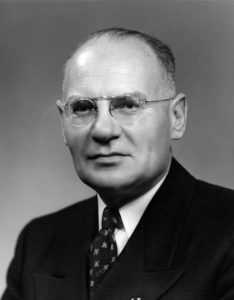Back to series
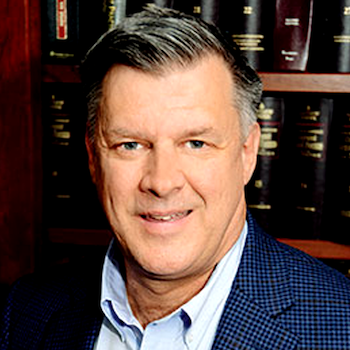


Download or Listen to Audio
Profile in Faith: V. Raymond Edman
Click here to open a Print - Friendly PDF
With the help of a friend, she dyed her wedding dress black, the color of mourning, to wear that afternoon at her young husband’s funeral. The date was July 4, 1925, and their baby son, Charles, was only seven weeks old.
Just over a year earlier, Edith was radiant as a bride in her stunning, white wedding dress. Her adoring sweetheart, V. Raymond Edman, had eagerly awaited the wedding at mission headquarters in Quito, Ecuador. But then Ray, whom Edith affectionately called “Friend Prexy,” had contracted typhus fever. Dr. Herbert Parker, an expert in tropical diseases, had to break the hard news to her that Ray’s feet were already cold; he wasn’t long for this earth. A friend, Will Reed, ordered a native coffin made of wood, covered in black cloth, to be ready for the burial. The climate of the tropics demands a quick interment. The funeral service was planned and scheduled for 3:00 p.m.
Ray and Edith met at Park Street Church in Boston through a mutual friend and mentor, E. Joseph Evans, otherwise known as “Uncle Joe.” Prior to meeting they had each heard God’s still small voice calling them to serve in missions, specifically in South America. As they grew in love for each other, “They prayed together and agreed to separate for a time to test the sincerity of their love and to determine the will of God fully. By spring 1923, they were convinced it was God’s will for them to become engaged, to get married later and finally to serve together in South America.”1
Their mutual calling led them to the Quechua Indians in Ecuador.
They were married, welcomed their first child, and things were looking bright. God was blessing their work, and they were developing good relationships with the Indians. Then suddenly, death was lurking on their doorstep.
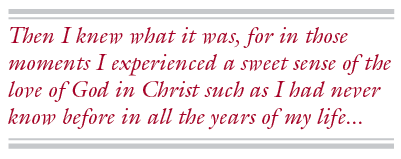 Ray knew that he was dying, though he was unaware that people were busy preparing for his funeral. He recalled what his mother had told him as a child—that often when people are about to die, their life plays out before their eyes; they remember the people and events that shaped them. This happened to Ray as he thought of his childhood home in Illinois, his grade school teachers, friends from school, his days serving in the army in World War I. Ray wrote, “It was something like the unfolding of a newsreel, and with it there came the clear consciousness, ‘Now I have come to die.’”2
Ray knew that he was dying, though he was unaware that people were busy preparing for his funeral. He recalled what his mother had told him as a child—that often when people are about to die, their life plays out before their eyes; they remember the people and events that shaped them. This happened to Ray as he thought of his childhood home in Illinois, his grade school teachers, friends from school, his days serving in the army in World War I. Ray wrote, “It was something like the unfolding of a newsreel, and with it there came the clear consciousness, ‘Now I have come to die.’”2
At this point Ray became aware of what he described as a “Presence” that slowly entered the room, rising from the ground up to the level of his bed; soon it completely filled the room. At first Ray wondered what this surrounding influence or “Presence” might be. He wrote, “Then I knew what it was, for in those moments I experienced a sweet sense of the love of God in Christ such as I had never known before in all the years of my life… It is sufficient to say that I have no fear of dying. Heaven is home to the believer, to that one who has become a child of God through faith in the Lord Jesus Christ.”3
Ray, like Lazarus in John 11, had faced death. But unlike Lazarus, Ray was never buried in that black coffin. Edith didn’t have to wear her blackened wedding dress that day. About a week later, Ray was able to recognize his wife and was gradually restored to health, a testimony of Jesus’ resurrection power.
And now the rest of the story. Weeks later Ray learned that on the very day of his “personal hand to hand conflict with death”4 on July 4, 1925, “Uncle Joe” was at a Bible Conference at the Alliance Camp Hebron in Attleboro, Massachusetts. Suddenly Uncle Joe was burdened to intercede on behalf of Ray. He pleaded with the congregation of about two hundred to stop what they were doing and pray for V. Raymond Edman in Ecuador. He discerned by the Holy Spirit’s prompting that Ray was facing some kind of crisis and needed to be delivered. What followed were some fiercely intense hours of prayer.
Years later those present still remembered the fervency of their intercessions. They prayed and fasted through midday, and then in the midafternoon they felt a release of spirit, suddenly assured “that their prayers for the desperate need thirty-five hundred miles away had been answered.”5
Evangelical scholar Walter Elwell writes, “From that moment on, although often called upon to suffer physically and emotionally, Edman’s life was characterized by a sense of God’s presence and never failing good cheer. He had seen beyond the veil, and what had greeted him was the unfathomable love of God.”6
The Early Years
What was so special about Victor Raymond Edman that God would so dramatically spare his life? Edman himself would have stated that it was simply God’s grace. He didn’t come from an influential or wealthy family or attend prestigious schools. He was born on May 9, 1900, to Anders and Alma Edman, Swedish immigrants who settled in Chicago.
He was the second son of six children, was nearsighted, and wore thick glasses his whole life. He liked to read, was a good student, and showed leadership ability as he entered high school. He loved sports and public speaking and always had a sense for adventure. His family worshiped at the Swedish Missionary Church, and he grew up in a family devoted to prayer and Scripture reading. In his senior year of high school, in June 1918, he accepted Christ as his Savior at an evangelistic service led by Dr. I.E. Honeywell. Later Edman reflected, “Perhaps my happiest moment was on a summer’s night when there came assurance of salvation.”7
Edman the Soldier
Just a month after his conversion to Christ, Ray and his friend, Walter Hoeppner enlisted in the US Army to serve their country in World War I. Once in the service, Ray, trained as a medic, longed to get overseas. In a letter to a friend he wrote, “I’ve asked the Lord every day to put me on a shipment, and if He wants me to go, I have entrusted my future to Him, and I know that He will do the best for me.” Soon after this prayer, he landed in Europe just after the Armistice of November 11, 1918. Just before Christmas his unit endured a long march in the snow and cold of Eastern Germany.
When they arrived at a lice-ridden, former POW camp for Russian soldiers, Edman was exhausted, ill, and feverish. All he wanted to do was fall on a bed and sleep. But a burly first sergeant commanded Edman to lead a detail of five men to another company miles away. As the rest of the men assigned to this march prepared their belongings, Edman slipped in to an empty room that the Russians had used as a tavern. There he knelt in front of a bench and cried out to God, “Lord, I cannot go, I am so ill, so worn, with such a sore throat and fever that I cannot go. And I do not know how far C Company may be stationed!”8
At that moment, for the first time in his life, Edman became aware of a “Presence” beside him. He knew immediately that it was Jesus. He couldn’t see or touch him, but he heard Jesus say, “I will go with you.” He arose from that encounter with the living Christ with a renewed strength and peace. He then led his group through the deep snow and trudged throughout the afternoon, eventually arriving at a home in Boden—C Company headquarters. The woman of the house, noticing that Ray was not well, gave him a hot meal and a warm feather bed in the attic with her brother rather than bunking him in the unheated room with the other soldiers. This experience of the the Spirit’s presence had a profound effect on the young Edman as he was learning to trust the Lord in the midst of difficulties.
Edman’s Education and Mentor
After his military service, Edman spent two years at the University of Illinois, where he studied French and Spanish. He already spoke Swedish, German, and English. During a Bible conference between his freshman and sophomore years, through the influence of Paul Rader, the pastor of Moody Memorial Church in Chicago, Edman dedicated himself to missionary service in South America.
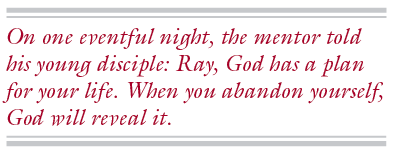 When Rader became the president of the Missionary Training Institute in Nyack, New York, Edman decided to take a one-year break from his studies at Illinois and teach Spanish and take courses at Nyack. During this time Edman met “Uncle Joe” and his own future wife, Edith Olson, on a trip to Boston.
When Rader became the president of the Missionary Training Institute in Nyack, New York, Edman decided to take a one-year break from his studies at Illinois and teach Spanish and take courses at Nyack. During this time Edman met “Uncle Joe” and his own future wife, Edith Olson, on a trip to Boston.
Uncle Joe saw great potential in Ray, and out of that developed a lifelong Paul–Timothy-type relationship. Sensing that Ray was somewhat restless, Uncle Joe invited him to move to Boston and live with him as he explored what God had in store. On one eventful night, the mentor told his young disciple, “Ray, God has a plan for your life. When you abandon yourself, God will reveal it.” Almost immediately, Ray fell on his knees and prayed that he would “abandon himself to God and await his will.”9 He realized that his love for adventure and “busy holiness” had hindered him from discerning God’s direction in his life.
For the next two years, as Edman completed a bachelor’s degree in Spanish at Boston University, his relationship with Edith grew. Soon after his graduation, Edman traveled to Ecuador for mission work, with the plan that Edith would soon join him.
Anywhere, Lord?
Ray and Edith loved their mission work in Ecuador. They were able to start a small Bible school, and in five years of marriage they were blessed with two sons, Charles and Roland. They had witnessed firsthand the miraculous life-giving power of God as Ray walked through the valley of the shadow of death. And yet the aftereffects of the typhus and life in the tropics took their toll on Ray’s body. In an effort to regain his health, Edman traveled with his three-year-old son, Charles, to the United States to see if a change in climate would help him physically.
Edith and their one-year-old son, Roland, stayed behind in Ecuador awaiting their return. On this sea voyage, Edman came upon Moffatt’s translation of 2 Corinthians 2:14, “Wherever I go, thank God, he makes my life a constant pageant of triumph in Christ.” In his physical weakness, Edman felt nothing like a “pageant of triumph in Christ.” So he prayed, “Dear Lord, be pleased to make my life that constant pageant of triumph, always to be led in triumph in Thee!”
He was startled by the answer to this prayer, as he heard the Holy Spirit say, “Are you willing to go anywhere for Me?”
“Anywhere? Yes, Lord, anywhere in Ecuador Thou mayest say.”
“I did not say ‘in Ecuador,’” was the reply.
After a time, Edman recalls quietly, with sincerity of heart, replying, “Yes, Lord, anywhere Thou sayest I will go, only that my life may be always a constant pageant of triumph in Thee.”
Edman wrote later, “Death to my own plans and desires was almost deliriously delightful. Everything was laid at His nail-scarred feet, life or death, health or illness, appreciation by others or misunderstanding, success or failure as measured by human standards. Only He Himself mattered.”10
Fourth President of Wheaton College
Following his abandonment to God’s will for his life and willingness to go anywhere, Edman became the pastor of a small church in Worcester, Massachusetts. While serving there he completed a PhD program in international relations at Clark University and began hosting a morning radio program on WORC.
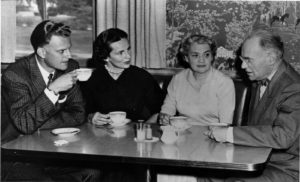 While praying one cold morning in January 1936, Edman heard the Lord say, “Wheaton College.” That seemed strange. The idea of teaching at Wheaton had never crossed his mind. Yet two months later, this word from the Lord was confirmed when Edman was invited to join the faculty of Wheaton College, in Illinois.
While praying one cold morning in January 1936, Edman heard the Lord say, “Wheaton College.” That seemed strange. The idea of teaching at Wheaton had never crossed his mind. Yet two months later, this word from the Lord was confirmed when Edman was invited to join the faculty of Wheaton College, in Illinois.
Teaching history, Edman soon became one of the most popular professors on campus. He also gained respect among the faculty for his sharp mind, clear thoughts on education, and ability to communicate well in public settings.
So in January 1940, when the board of trustees came to a point of irreconcilable differences with the college’s president, J. Oliver Buswell, Jr., the name of V. Raymond Edman was proposed as an “acting president.” Thus began Edman’s twenty-five years of service to Wheaton College and to the greater Christian community as the institution’s president. During his tenure, the college expanded its financial endowments, its enrollment rose by 50 percent, and the campus added fourteen buildings. He established the Office of Chaplain, witnessed a campus revival in 1950, and had a lasting impact on the lives of faculty, staff, and students such as Billy Graham.
Mentor to Billy Graham
Soon after Edman became president of Wheaton College, his mother and brother happened to hear a young preacher by the name of Billy Graham while they were vacationing in Florida. They encouraged Graham to go to Wheaton College to get further training. He accepted their counsel and enrolled at Wheaton in the fall of 1940. Graham writes in his autobiography, “Prexy Edman won my heart at once. Crossing campus one of my first days there, I was greeted by a person I did not recognize. ‘Hi, Bill!’ he said. I found out the next day he was president of the college.”11
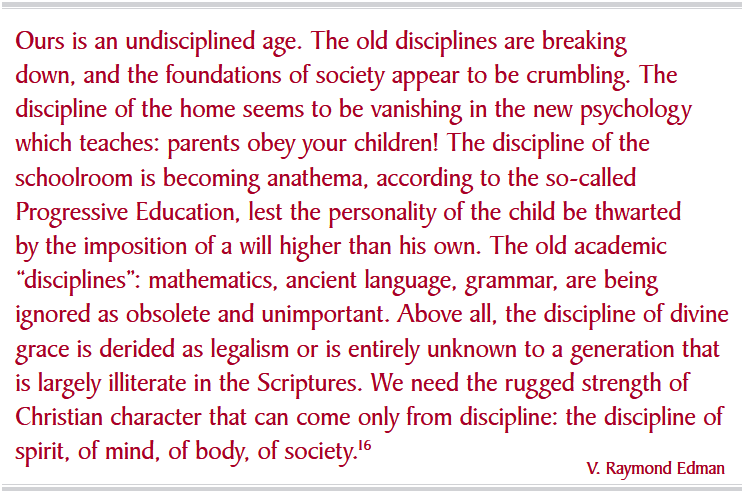
Billy couldn’t get over the fact that though he’d never met the man, Edman already knew his name! Their second meeting took place at a prayer meeting when Dr. Edman told Billy that he’d heard good things about him from his mom and brother and that if he needed anything not to hesitate to contact him. Graham would write,
I never dreamed this was the beginning of one of the warmest, most enduring and important friendships of my entire life. Here was a man deep in the things of God, his life saturated with Scripture and prayer. Here was a man of courage and integrity—but most of all compassion… He was a marvelous listener. His counseling and his prayers were usually brief but to the point.12
Just as young Edman had once been mentored, encouraged, challenged, and held up in prayer throughout his life by his mentor in the faith, Uncle Joe, so Edman became that kind of spiritual father and friend to Billy Graham.
Dr. Edman would have a lifelong impact on Graham’s life and ministry. Prexy encouraged Billy’s budding relationship with Ruth, commenting one day, “Bill, Ruth’s one in a million.” He also recommended that Billy succeed him as a preaching pastor at the local Tabernacle Church, while Graham was still a student. To make Billy’s preaching assignment easier, Edman would provide him with sermon outlines that he could adapt since he knew Billy had a full academic load and didn’t have time to prepare.
In the years to come, whenever Billy had a major decision to make, he would call Prexy. Edman would give no direct advice but would tell Billy, “Do what the Lord tells you to do.” Then they would pray about it. When Graham found himself in the midst of controversy, Edman stayed by his side and encouraged him with the words, “Billy, pay no attention. You have only one Person to please, and that’s the Lord.” Edman became one of the charter board members of the Billy Graham Evangelistic Association and brought wisdom and good counsel to the board. Edman always adjourned the board meetings early saying with a smile, “You cannot accomplish anything after nine o’clock.” That was in part because he was an early riser who met the Lord in prayer in the wee hours of the morning.
Billy Graham has noted that as he traveled the world he would meet people who told him how they had been positively influenced by Raymond Edman. He writes, “We will never know the full evaluation of his life and ministry until we stand at the judgment seat of Christ, but still I have to say that he was the most unforgettable Christian I ever met.”13
In the Presence of the King
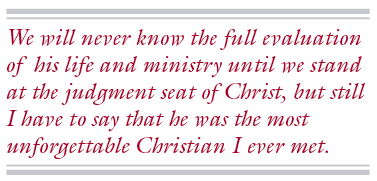 In 1965 Dr. Edman passed the baton of the Wheaton presidency to his former Wheaton student, now proven leader, who was also a friend of Uncle Joe: Hudson T. Armerding.
In 1965 Dr. Edman passed the baton of the Wheaton presidency to his former Wheaton student, now proven leader, who was also a friend of Uncle Joe: Hudson T. Armerding.
Edman was promoted to the position of chancellor so that he could continue to represent Wheaton, albeit with a lighter load. He was also elected as the senior vice president of the Billy Graham Evangelistic Association.
On September 22, 1967, Chancellor Edman stood before the Wheaton College faculty and students to give a chapel message titled “In the Presence of the King.” The 1960s were turbulent times, as the Vietnam War raged. Students on the Wheaton campus were struggling with how to make sense of it all. Edman knew that what Christians in Wheaton and elsewhere needed was a return to seeking a daily audience with the King of kings.
In Edman’s commitment to follow God anywhere, he had developed relationships with world leaders such as Madame Chiang Kai-shek, President Richard Nixon, and His Majesty Haile Selassie of Ethiopia. He began his chapel message by telling of an invitation he received to enter the throne room of King Selassie. He described the protocol and respect required to enter into the king’s presence. Then Edman stated,
But I speak primarily of another King. This chapel is the house of the King. Chapel is designed to be a meeting on your part with the King of kings and the Lord of lords Himself. To that end, chapel is designed for the purpose of worship… not a lecture, not an entertainment, but a time of meeting the King. Coming in, sit down and wait in silence before the Lord. In so doing, you will prepare your own hearts to hear the Lord, to meet with the King. Your heart will learn to cultivate what the Scripture says, “Be still and know that I am God.” Over these years I have learned the immense value of that deep, inner silence as David, the king, sat in God’s presence to hear from him.14
Those were V. Raymond Edman’s last words on earth as he turned, collapsed on stage and entered the presence of the King of kings whom he had served so long and well.
Conclusion
Dr. V. Raymond Edman, husband, father, friend, soldier, missionary, pastor, professor, mentor, devotional writer, college president and chancellor, was first and foremost a disciple of Jesus Christ. In his book They Found the Secret, Edman noticed a common pattern that is lived out by mature disciples of Jesus:
The pattern seems to be self-centeredness, self-effort, increasing dissatisfaction and outer discouragement, a temptation to give it all up because there is no better way, and then finding the Spirit of God to be their strength, their guide, their confidence and companion—in a word, their life. The crisis of the deeper life is the key that unlocks the secret of their transformation. It is the beginning of the exchanged life. What is the exchanged life? Really it is not some thing; it is some One. It is the indwelling of the Lord Jesus Christ made real and rewarding by the Holy Spirit.15
Victor Raymond Edman found the secret. And so can we.
Notes
1. Earle Cairns, V. Raymond Edman: In the Presence of the King (Moody Press: Chicago, 1972), 35.
2. V. Raymond Edman, They Found the Secret: 20 Transformed Lives That Reveal a Touch of Eternity (1960; repr., Grand Rapids: Zondervan, 1984), 179.
3. Edman, They Found the Secret, 179.
4. Cairns, V. Raymond Edman, 52.
5. Edman, They Found the Secret, 180.
6. Quoted in Edman, They Found the Secret, 8–9.
7. Cairns, V. Raymond Edman, 18.
8. Edman, They Found the Secret, 177.
9. Cairns, V. Raymond Edman, 33.
10. Edman, They Found the Secret, 182.
11. Billy Graham, Just as I Am: The Autobiography of Billy Graham (Grand Rapids: Zondervan, 1997), 63.
12. Quoted in Edman, They Found the Secret, 5–6.
13. Quoted in Edman, They Found the Secret, 8.
14. V. Raymond Edman, The Presence of the King, chapel talk at Wheaton College, September 22, 1967, (includes audio).
15. Quoted in Edman, They Found the Secret, 12.
16. V. Raymond Edman, The Disciplines of Life (Chicago: Van Kampen Press, 1948), 4.

Joel Woodruff
President, C.S. Lewis InstituteJoel Woodruff, President, C.S. Lewis Institute, has worked in higher education, “tent-making,” nonprofit administration, and pastoral ministries in Alaska, Israel, Hungary, France, and Northern Virginia. He served as Dean of Students, Chaplain, and Professor of Bible & Theology at European Bible Institute, where he helped train Europeans both for professional ministry and to be Christian leaders in the marketplace. Prior to joining the Institute, he was on the leadership team of Oakwood Services International, a nonprofit educational and humanitarian organization. He is a graduate of Wheaton College, earned his M.Div. from Gordon-Conwell Theological Seminary, and has a doctorate in Organizational Leadership from Nova Southeastern University. As a Parish-Pulpit Fellow, he studied Biblical Backgrounds & Archaeology in Israel for a year.

 COPYRIGHT: This publication is published by C.S. Lewis Institute; 8001 Braddock Road, Suite 301; Springfield, VA 22151. Portions of the publication may be reproduced for noncommercial, local church or ministry use without prior permission. Electronic copies of the PDF files may be duplicated and transmitted via e-mail for personal and church use. Articles may not be modified without prior written permission of the Institute. For questions, contact the Institute: 703.914.5602 or email us.
COPYRIGHT: This publication is published by C.S. Lewis Institute; 8001 Braddock Road, Suite 301; Springfield, VA 22151. Portions of the publication may be reproduced for noncommercial, local church or ministry use without prior permission. Electronic copies of the PDF files may be duplicated and transmitted via e-mail for personal and church use. Articles may not be modified without prior written permission of the Institute. For questions, contact the Institute: 703.914.5602 or email us.
-
Recent Podcasts
Ralph Waldo Emerson’s Philosophy and Influence
by David George Moore on July 26, 2024Ralph Waldo Emerson was a gifted nineteenth century...Read More
-
The Side B Stories – Nate Sala’s Story
by Jana Harmon, Nate Sala on July 19, 2024
-
Terrorism Through the Eyes of Faith
by Dennis Hollinger on July 12, 2024
-
Recent Publications
Hasn’t Science Proven That Belief in God Is an Outdated Superstition?
by Sharon Dirckx on July 1, 2024Many assume that scientific practice and belief in...Read More
-
Has the Bible Been Corrupted as Some Muslims Claim?
by Andy Bannister on June 1, 2024
-
Seeing Jesus Through the Eyes of Women
by Rebecca McLaughlin on May 15, 2024
0
All Booked
0.00
All Booked
0.00
All Booked
22194
C.S. Lewis’s The Abolition of Man Live Online Small Group 8:00 PM ET
https://www.cslewisinstitute.org/?event=c-s-lewiss-the-abolition-of-man-study-course&event_date=2024-10-02®=1
https://www.paypal.com/cgi-bin/webscr
2024-10-02

Next coming event
Days
Hours
Minutes
Seconds
C.S. Lewis’s The Abolition of Man Live Online Small Group 8:00 PM ET
On October 2, 2024 at 8:00 pmTags
Speakers
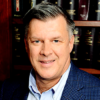
Joel Woodruff
President, C.S. Lewis Institute
Team Members

Joel Woodruff
President, C.S. Lewis InstituteJoel Woodruff, President, C.S. Lewis Institute, has worked in higher education, “tent-making,” nonprofit administration, and pastoral ministries in Alaska, Israel, Hungary, France, and Northern Virginia. He served as Dean of Students, Chaplain, and Professor of Bible & Theology at European Bible Institute, where he helped train Europeans both for professional ministry and to be Christian leaders in the marketplace. Prior to joining the Institute, he was on the leadership team of Oakwood Services International, a nonprofit educational and humanitarian organization. He is a graduate of Wheaton College, earned his M.Div. from Gordon-Conwell Theological Seminary, and has a doctorate in Organizational Leadership from Nova Southeastern University. As a Parish-Pulpit Fellow, he studied Biblical Backgrounds & Archaeology in Israel for a year.



